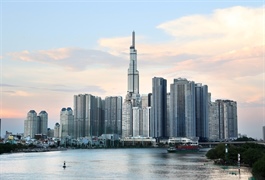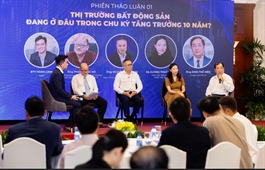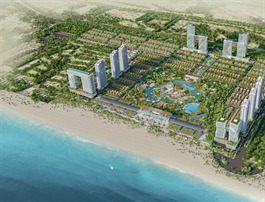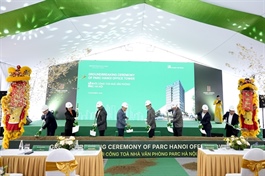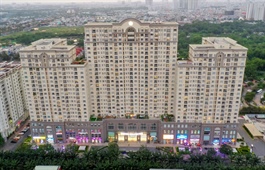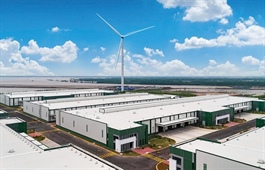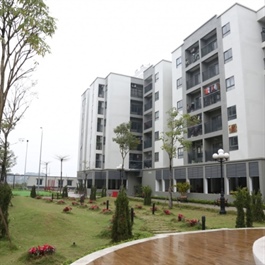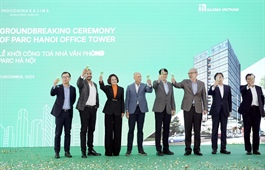Vietnam a rising star for industrial real estate investment
Vietnam a rising star for industrial real estate investment
Vietnam has emerged as a global hotspot for industrial real estate investment thanks to a combination of strategic economic reforms, strong foreign direct investment (FDI) growth, and significant global shifts in supply chain management.
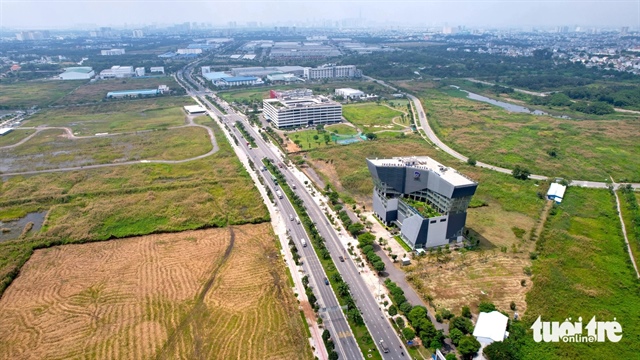
The Saigon High-Tech Park in Ho Chi Minh City. Photo: Ngoc Hien / Tuoi Tre |
In 2024, the industrial property sector has experienced dynamic development, underscoring Vietnam’s potential as one of Asia’s key manufacturing and logistics hubs.
Industrial real estate boom fuels optimism
According to Avision Young Vietnam’s 'Vietnam Real Estate 2024: A Year in Review' report published on December 16, Vietnam’s industrial real estate market has outpaced other real estate segments throughout 2024, with rents steadily rising, industrial land rates increasing 2-5 percent per quarter, and occupancy rates remaining high.
This robust growth has been further supported by the development of new industrial park projects whose investors received investment licenses or began construction in provinces across the country, indicating the government’s commitment to expanding the nation’s industrial capacity.
Vietnam’s geographical location plays a pivotal role in its appeal to investors thanks to its proximity to major markets, including China, India, and ASEAN.
As multinational corporations adopt the 'China+1' strategy to diversify their manufacturing bases, Vietnam has risen as a clear choice for the '+1,' as illustrated by NVIDIA’s recently announced plans to establish its first AI center in the country.
The rapid expansion of e-commerce, technology-driven industries, and logistics has significantly increased demand for advanced industrial facilities.
Investors and developers are focusing on ready-built warehouses and factories equipped with cutting-edge technology to support high-tech manufacturing and logistics operations.
Developing data centers and AI facilities in Vietnam has become a trend following new laws that permit foreign investors to participate in Vietnam’s telecommunications sector.
At the same time, the country’s emphasis on sustainability has become a defining feature of its industrial real estate landscape.
Developers are increasingly prioritizing green-certified facilities which meet environmental, social, and governance (ESG) standards.
The LEGO factory in Binh Duong Province, just outside Ho Chi Minh City, is pursuing LEED Gold certification, highlighting the country’s readiness to adopt environmentally friendly industrial infrastructure.
This focus on sustainability is not limited to multinational corporations; domestic developers such as BW Industrial and Fraser Property have also embraced modern, eco-conscious designs for their industrial parks.
These projects underscore the sector’s alignment with global trends and Vietnam’s ambitions to lead the way in sustainable industrial development.
Policy reforms strengthen investor confidence
Recent legal reforms have provided a solid foundation for attracting increased investment into the industrial real estate sector.
The implementation of the 2024 Land Law, the 2023 Housing Law, and the 2023 Real Estate Business Law marked a turning point for the local real estate market. These laws introduced greater transparency, streamlined procedures, and enhanced fairness in transactions, all having significantly boosted investor confidence.
Notably, these reforms clarified the conditions for foreign investors and simplified licensing processes for industrial projects, making it easier for businesses to access clean and ready-to-transfer industrial land.
Improved compensation policies for land acquisition and the publication of real estate project information have further strengthened trust in the market.
These regulatory advancements not only promote a stable investment environment but also set the stage for long-term growth in the industrial real estate sector.
Despite global economic challenges, Vietnam’s industrial real estate sector has demonstrated impressive resilience in 2024.
While global FDI flows showed only modest growth, Vietnam recorded a remarkable surge in FDI within the real estate sector, particularly in industrial projects.
By November, accumulated FDI in real estate had reached US$5.63 billion, marking an-89.1-percent year-on-year climb.
The steady rise in realized FDI, which jumped 7.1 percent year on year in the first eleven months of 2024, highlights investor confidence in Vietnam’s potential.
Despite ongoing geopolitical uncertainties and a global manufacturing slowdown, foreign investors have continued to implement licensed and approved projects in Vietnam.
The government’s focus on improving infrastructure -- such as highways, seaports, and airports -- has further reinforced Vietnam’s attractiveness as a manufacturing and logistics hub.
Opportunities and challenges on the horizon
Looking ahead, Vietnam’s industrial real estate market presents numerous opportunities for growth.
Provinces like Bac Ninh, Hai Phong, and Binh Duong are emerging as key industrial hubs, offering competitive land costs, abundant labor resources, and proximity to export markets.
The rapid expansion of e-commerce platforms in Vietnam has also created increased demand for modern logistics facilities, including distribution centers and last-mile delivery hubs.
Furthermore, the country’s readiness to embrace high-tech investments is evident from the growing interest in data centers and advanced industrial infrastructure.
However, challenges persist. Infrastructure gaps remain a pressing issue, particularly in regions experiencing rapid industrialization.
Although Vietnam has made significant progress in developing transportation and logistics networks, continued investment is needed to meet the demands of industrial growth.
While the legal reforms introduced in 2024 are widely praised, businesses and investors are seeking clearer guidelines for their implementation.
Rising land acquisition and construction costs are another concern for developers, potentially impacting the feasibility of new projects.
As Vietnam continues to evolve as a manufacturing and logistics hub, the industrial real estate sector is poised for a transformative era.
The combination of strategic location, robust legal reforms, and a commitment to sustainability has positioned the country as a leading destination for industrial investment.
By addressing existing challenges and leveraging its strengths, Vietnam can unlock the full potential of this burgeoning sector.
David Jackson, CEO of Avison Young Vietnam, noted that significant changes in policies, investment trends, and the business landscape in 2024 provide a strong foundation for optimism.
He emphasized that now is the time to restart capital flows into industrial real estate and embrace a new growth cycle.
His sentiment reflects the growing confidence among investors and industry leaders in Vietnam’s industrial real estate market.
Vietnam’s journey as an industrial real estate leader has only just begun. With sustained investment, innovation, and a focus on sustainable practices, the sector is well-positioned to contribute significantly to the nation’s economic growth and global competitiveness.
As the world continues to shift toward more diversified and sustainable supply chains, Vietnam stands ready to play a central role in shaping the future of industrial real estate in Asia.



